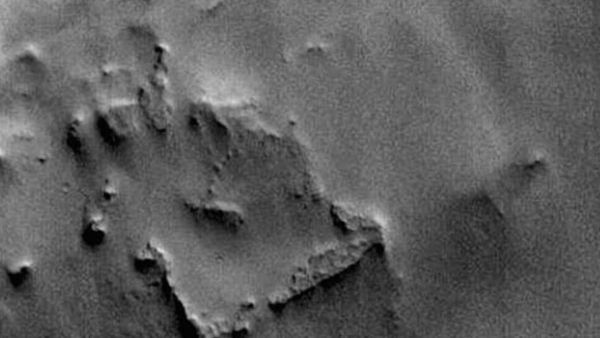ALBAWABA - A recently resurfaced image from Mars has ignited widespread speculation on social media, prompting SpaceX founder Elon Musk to respond with a bold proposal.
Between 1996 and 2006, NASA’s Mars Global Surveyor probe captured and transmitted 240,000 images of the Martian surface. However, one image taken on November 4, 2001, has drawn particular attention. The photo, available on Arizona State University’s website, shows a square-shaped formation inside a crater, leading some enthusiasts to speculate that it might be the remains of an ancient structure of extraterrestrial origin buried beneath the sands of Mars.
The Mars Global Surveyor mission, which lasted a decade, significantly enhanced scientists’ understanding of the planet, providing evidence that water may still intermittently flow on Mars and identifying mineral deposits associated with water activity. These findings influenced the selection of landing sites for later Mars missions.
Elon Musk joined the discussion on X (formerly Twitter) in response to a post by Joe Rogan, a known supporter of former U.S. President Donald Trump. Musk proposed a straightforward approach, stating: "We should send astronauts to Mars to investigate."
The Mars Global Surveyor continued operations until November 2006, when it ceased functioning due to a computer error, possibly linked to a battery failure.
Musk has long advocated for human exploration of Mars and recently announced SpaceX's plan to launch five unmanned missions to the Red Planet within the next two years.
He suggested that a crewed mission could follow within four years, provided the unmanned flights land safely. If challenges arise, human exploration could be postponed by two additional years.
Musk’s ultimate vision is to establish a human colony on Mars by 2054, aiming to support one million residents.
However, not all experts are convinced of Musk’s ambitious plans. Professor Andrew Coates, a Mars researcher at University College London, warned that human missions could contaminate the planet, making it difficult to determine if life ever existed on Mars.
Coates argued that if humanity genuinely seeks answers about extraterrestrial life, sending one astronaut rather than an entire crew would be a more prudent approach.
"The last thing we need is to transport Earth’s life to Mars," he stated. "Robotic exploration remains the best method."










